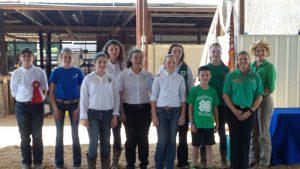by Heather Kent | Feb 23, 2017
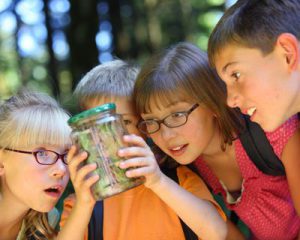
Photo credit: UF
There are two kinds of people in the world- those that think bugs are really cool and those that run screaming from anything that slightly resembles an insect. If you or a family member are the former, then prepare to be excited! We are happy to announce that there will be a new competitive event coming to Florida 4-H. It is being developed by a team of specialists, volunteers and youth who are passionate about the exciting world of entomology. The Florida 4-H Insectathon will be held January 20th, 2018 in Gainesville, FL and will include the following events:
- Insect Collection Contest
- Honey Bee Essay Contest
- Insect Art Contest
- Entomology Identification and Skill-a-thon Contest
- Educational tours for both contest participants and their family members
This event will help youth master skills such as how to use a dichotomous key, how to make observations, record keeping skills, pinning skills, and communication skills- it may even aspire some youth to pursue a career related to entomology! To help volunteers, parents and youth get started, the experts will be teaching a workshop here in the Panhandle on Saturday, May 6th, from 10AM-2PM. Registration is open March 1st through April 28th via 4HOnline. Participants will receive hands-on experience collecting, identifying and pinning insects, as well as a startup kit of resources to share with other youth in your county. Counties are encouraged to send a team of youth and adults to this workshop. Lunch will be provided, so there is a small fee of $15.00/person.
If you have a passion for nature and would like to inspire the next generation, consider sharing your expertise as a 4-H entomology project or resource leader. For more information, contact your local UF IFAS Extension Office, or visit http://florida4h.org.
Other Resources of Interest:
by Julie Pigott Dillard | Feb 15, 2017

4-H Leader and Librarian, Renae Roundtree, found a way to teach not only STEM, but help youth develop a life-long passion for reading.
Books, DVD’s, audio books, magazines and…LEGO’s? Yes, all of these can be found at the Washington County Public Library along with enthusiastic 4-H Club Leader, Renae Rountree. Renae, Director of the WCPL, partnered with Washington County 4-H three years ago to “LEGO My Library” and start the Brick Bratz 4-H Club that meets twice a month at the library.
The secret to this club’s success (that always has a waiting list) is Renae’s commitment to providing a fun, educational experience where kids are free to explore, question, succeed, fail and try again. Using the LEGO StoryStarter program, youth listen to a task that gets them and their partner started on an adventure of writing a comic-style story.
The StoryStarter kit includes LEGO pieces with five small panels and a computer based program. Working with a partner, youth illustrate their story with LEGOs, panel by panel, then take pictures of each panel and upload them to their laptop. They add dialogue and background scenes to finish their story. It’s so much fun, the kids don’t even realize they’re practicing skills like communication, teamwork, decision making and conflict resolution.
Rebecca Lee, a Brick Bratz 4-H Club member for three years, said “I like Lego club because it’s very fun to create our own stories and make the Legos move. Ms. Renae makes us laugh too!” Rebecca and her brother, Sam, “…always look forward to club days and are excited to share their creations with me and their father,” says their mom, Terri.
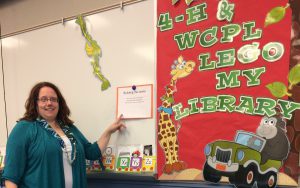
Youth practice creativity while building sets that serve as the backdrop for their robots to act out scenes from their favorite books.
Why does Renae volunteer her time with 4-H? She wants to give kids access to new and exciting ways to learn and grow that appeal to their sense of curiosity. Her enthusiasm for learning and sharing is infectious, and her club members are thriving with her guidance and direction!
Thanks to volunteers like Renae Rountree, 4-H is growing in Washington County! If you would like to provide the spark to ignite a youth’s interest in a field or hobby that you are passionate about, consider becoming involved in your local 4-H program. 4-H offers a variety of roles to fit your schedule and interests. If you’d like more information on how to get involved as a 4-H volunteer, contact your local 4-H agent or visit http://florida4h.org.
by Prudence Caskey | Feb 2, 2017
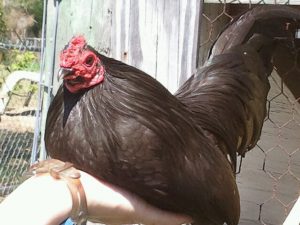 The term “Backyard Chickens” is one many people use today. The idea of having a pet help you make breakfast is growing in popularity. I am often questioned as to which breed of chicken is the best breed. When asked, I always reply, “What do you want the chicken to do?” The reason I ask is because The American Poultry Association recognizes 65 different breeds of chickens. Each breed can meet a different need. Many people will blurt out, “I want eggs!” Well, do you care what color eggs? Do you care how often you get eggs? Does the size of the egg matter? Each breed is different and there are pros and cons to each breed. Some of the more popular breeds that you can find at your local feed store during upcoming “Chick Days” are described below:
The term “Backyard Chickens” is one many people use today. The idea of having a pet help you make breakfast is growing in popularity. I am often questioned as to which breed of chicken is the best breed. When asked, I always reply, “What do you want the chicken to do?” The reason I ask is because The American Poultry Association recognizes 65 different breeds of chickens. Each breed can meet a different need. Many people will blurt out, “I want eggs!” Well, do you care what color eggs? Do you care how often you get eggs? Does the size of the egg matter? Each breed is different and there are pros and cons to each breed. Some of the more popular breeds that you can find at your local feed store during upcoming “Chick Days” are described below:
- Rhode Island Red: This is a breed that is a large-bodied bird that lays a large to extra-large brown egg. These hens are very personable and can have a great personality. This breed can become a pet in no time.
- White Leghorn: This particular bird will lay a large white egg on a very regular basis. The Leghorn is not friendly and is often referred to as “flighty”. Leghorns will not, as a general rule, become pets. They will lay you an egg almost daily, but will run from you when it’s time to collect those eggs.
- (Buff) Orpington: Usually sold in the color buff, additionally available in other colors. This is a large-bodied friendly bird. Orpingtons can become fast friends and will serve as a dual-purpose member of your flock. This means that they are great egg layers, and will also serve as a good meat bird if the desire or need arises.
- Sex-link varieties: With this breed, you will not get a breed, but they have great production. Sometimes called Red Star, or Black Star, the chicks show a difference when day old chicks. It will be easy to determine between the two. If chicks are not your thing, you can always purchase young hens that are just starting to lay.
Many people are not ready to wait five to six months to get their beloved eggs from their new pets. If that is the case, you can always check with your local extension office to inquire if a local 4-H member might have some young hens for sale. On September 30th, 4-H members from across the panhandle will have a “Chick Chain” show and Auction. Save the date and get the best breed for you!
If you have children between the ages of 5-18 (as of September 1st, 2016) and you are interested in starting a backyard flock, you may want to sign up for the 4-H Chick Chain. This program teaches youth how to raise, care for, and show chickens. Registration is open February 1st-24th via 4HOnline. Youth will receive 12, day-old pullets on March 29th. Throughout the spring and summer, youth will learn the ins and outs of poultry farming, and how to market their eggs and hens for profit. They will keep business and health records, learn about bio-security, and gain poise, confidence, and communication skills while showing their hens in the fall. For more information, contact your local UF IFAS County Extension Office, or read about last year’s program.
4-H Poultry Project
4-H Embryology Project
4-H Chick Chain
Poultry Breeds:
Care of Baby Chicks
Factors Affecting Egg Production in Backyard Chicken Flocks
Intestinal Parasites in Backyard Chicken Flocks
Prevention and Control of Fowl Pox in Backyard Chicken Flocks
Small Flock Poultry Nutrition
Vaccination of Small Poultry Flocks
by Prudence Caskey | Jan 6, 2017
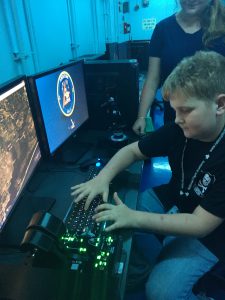
Kyle working the air traffic control booth at the National Flight Academy. Photo Credit: Prudence Caskey
4-H has joined forces with the National Flight academy to bring a unique and exciting aviation camp to our 4-Hers. The National Flight Academy builds heart-pumping, adrenaline-filled story line, which brings life to a mission as if the students are in a real-world scenario. Students apply these skills by flying the high-performance X-12 Triad, the National Flight Academy’s experimental aircraft, offering them hands-on comprehension of the principles of flight thrust, hovering and target drops. Our 3-day cruise will be held on President’s Day Weekend, February 18th – February 20th 2017. The event is open to 4-Hers across the Southeast and costs $375 per student which includes rooming, food, and a lot of fun and learning! This would be an awesome holiday or birthday gift for any special youth in your life.
Participation in the event can also help young people develop both life and workforce skills- not to mention academic achievement. Kyle Caskey, a Santa Rosa County 4-Her, attended a week-long cruise last summer and shared:
“Before I went to the National Flight Academy (NFA), I was really intimidated by math. I love science, but just didn’t get the math. At NFA, I was able to use math and see why it works. I brought my grade up to an A! Oh yeah, the food is really good too!”
Click Here for registration instructions: 4hregistrationletter-for-nfa. You must be registered before January 28th, 2017.
 The National Flight Academy is located on the NAS base at 1 Fetterman Way, NAS Pensacola, FL 32508. See more about the academy at http://www.nationalflightacademy.com.
The National Flight Academy is located on the NAS base at 1 Fetterman Way, NAS Pensacola, FL 32508. See more about the academy at http://www.nationalflightacademy.com.
If you have an interest in science, engineering, math, and/or technology (STEM), consider becoming a 4-H volunteer so that you can share your passion to spark the next generation of scientists, engineers and innovators. Contact your local UF IFAS County Extension Office or visit http://florida4h.org for more information.
by Jena Gilmore | Nov 10, 2016
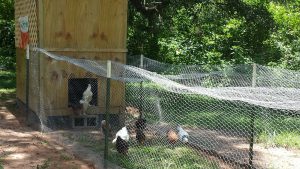
Youth unable to keep chickens at home were able to participate through Cooperative Coops at County Extension Offices. Photo credit: Heather Kent
On Saturday, October 29th, 4-H’ers from across the panhandle suited up in their 4-H Show gear, loaded up their chickens and ventured off to the inaugural Florida 4-H Chick Chain hosted at the Walton County Fairgrounds. This project was piloted last year with Alabama 4-H and is now an annual small animal science project offered here in the panhandle.
The objectives of the project are to help youth learn poultry nutrition and care, to develop communication skills, to develop basic record keeping skills, and to develop responsibility. Over 80 youth participated and have been raising their pullets since May. Over the summer, they participated in webinars and workshops to help prepare them for the show and complete their record books. Some youth participated individually, some youth shared pullets with their siblings (making it a family project). Youth not able to have chickens at their home were able to participate through a Cooperative Coop. Cooperative coops are housed at the Extension Office and youth have the opportunity to sign up for shifts to help “rule the roost” by feeding and watering the chicks, monitoring their health, changing bedding, and cleaning the coop.
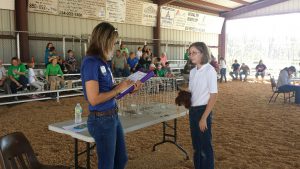
Youth were judged on poise, confidence and how they handled their birds. Photo credit: Heather Kent
On Show and Auction day, youth experienced many opportunities to showcase their “egg-celent” skills they learned through the Florida 4-H Chick Chain project. First, youth were required to check-in their birds at registration with the Agriculture Inspector. This was the final step in determining if the youth had followed all the proper bio-security measures to keep their chickens happy, healthy and disease free. Next, youth participated in a skill-a-thon to demonstrate what they have learned about breed identification, poultry anatomy, and how to set up a brooder properly. During the show, youth demonstrated their knowledge and communication skills with confidence. Youth were judged on how prepared they were to answer questions about their project and how well they handled their birds.
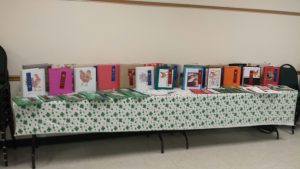
Youth kept records of their project and books were judged and displayed during the show.
Do you have a passion for poultry? If so, consider sharing it with 4-H as a volunteer. 4-H needs volunteers to help teach life skills through projects like this by sparking a lifelong interest in learning, Contact your local UF IFAS County Extension Office or visit http://florida4h.org.
Helpful Resources:
| Junior Showmanship |
1st |
Jena Putnam |
| 2nd |
Sheldon Sparks |
| 3rd |
Jake Rinehart |
| 4th |
Cass Dillard |
| 5th |
Ashlynn Peebles |
| Intermediate Showmanship |
1st |
Katie Ballard |
| 2nd |
Adrienne Murray |
| 3rd |
Lily Smith |
| 4th |
Isaac Hosford |
| 5th |
Kailey Pettis |
| Senior Showmanship |
1st |
Mary Ballard |
| 2nd |
Klarissa Williamson |
| 3rd |
Ashlynn McDevitt |
| 4th |
Myra Miles |
| 5th |
Jayla Kindlespire |
| County Best of Show Grand & Reserve |
HOLMES |
G – Joshua Ernst
R – Emily Ernst |
| JACKSON |
G – Nathan Ziglar
R – Beau Miles |
| JEFFERSON |
G – Jake Rinehart
R – Ashlynn Peebles |
| LIBERTY |
G – Isaac Hosford
R – Millie Revell |
| OKALOOSA |
G – Lily Smith
R – Kaelen Chenard |
| SANTA ROSA |
G – Cayden Smith
R – Cat Proud |
| WAKULLA |
G – Adrienne Murray |
| WALTON |
G – Krista Laviolette
R – Leannah McDevitt |
| WASHINGTON |
G – Cole & Cass Dillard
R – Lillian, Sheldon Sparks & Natalie Taylor |
| Breed Best of Show Grand & Reserve |
BRAHMA |
G – Lily Smith
R – Cole & Cass Dillard |
| DOMINIQUE |
G – Jake Rinehart
R – Krista & Julie Laviolette |
| LEGHORN |
G – Beau Miles
R – Mary Ballard |
| POLISH |
G – Lillian & Sheldon Sparks, Natalie Taylor
R – Nathan Ziglar |
| RHODE ISLAND RED |
G – Emily Ernst
R – Jenna Putnam |
| WYANDOTTE |
G – Jayla Kindlespire
R – Kaelen Chenard |
| Overall Grand & Reserve (New) |
G – Lily Smith
R – Beau Miles |
| Overall Grand & Reserve (Returning) |
G – Emily Ernst
R – Myra Miles |
by Whitney Cherry | Oct 27, 2016
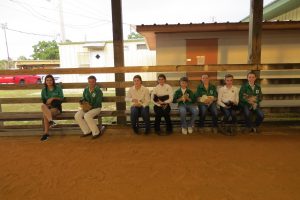
4-Hers are waiting for their moment with the poultry judge. Photo Credit: Misty Smith
I am often asked, “How do you wash a chicken?” I reply, “Just like a turkey, only on a smaller scale!” But for many 4-H’ers, washing chickens is part of showing chickens and is a skill they have to master.
Raising and showing poultry is quickly becoming a hobby for people of all ages. Youth who are active in a 4-H poultry project, are already one step ahead of the rest. Not only do they learn about poultry health, bio-security, and nutrition, they also learn about sportsmanship and other aspects of the poultry industry through showmanship. Many UF/IFAS Extension Offices offer day camps and clinics to help youth learn how to raise and show poultry, so contact your local office for more information- there’s one in every county! Here are a few steps 4-H youth can take to prepare for a poultry show:
Step 1: Handle your chicken daily. By handling your chicken daily, this will ensure that it is used to people, and will be friendly to the judge. A friendly chicken shows the judge that the chicken’s owner has been dedicated to preparing the bird for showing, not just ignoring it and bringing it to the show on show day.
Step 2: Practice holding your chicken. There is a correct way to hold a chicken when you are showing it and you will need to practice, practice, practice. When you and your bird feel comfortable around each other, you can start practicing holding and walking around with the bird the correct way, by placing your middle and fourth finger between the bird’s legs. Using your first finger and pinkie, hold the bird’s wings down. For carrying, put the bird’s head under your arm. When youth practice holding and carrying their bird, the bird becomes very docile and calm which makes for a great show chicken.
Step 3: Know the parts of the chicken. This step is one of the hardest in the entire showmanship procedure.
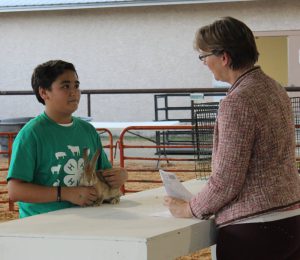
Poultry Showmanship can help youth build communication skills and confidence. Photo Credit: Julie Dillard
It is based on simply remembering the steps and practicing with your bird. Youth are quizzed on the parts of the chicken and whoever knows the most, does the best. Make sure you know about the head, wings, under color, width of body, breast, vent, abdomen, pubic bone, legs and feet, and how to cage a bird. All of these will ensure to the judge that youth have studied about their bird and are very knowledgeable on the parts of a chicken. Also, know about the breed of your chicken. You will want to do your homework on the breed of chicken that you are showing so any questions that the judge may ask about your bird you will know how to answer correctly.
Step 4: Know how to bathe your chicken. The easiest way to bathe a chicken is with a 5 gallon bucket of lukewarm water and dish soap. You want to “dip” the chicken 2-3 times in the soapy water, avoiding getting the head wet, and then dip them in clean water to rinse them off. Never submerge a chickens head in the water due to the fact that the chicken can aspirate and die. If your chicken’s head is soiled, use a wet cloth to wipe it clean. The chicken will take care of the rest by preening itself so make sure that you bathe the chicken 48 hours prior to the show so that there will be time for natural oil replacement. Place your chicken in a wire cage to ensure it stays clean before the show.
Step 5: Have fun! Showing chickens is a great and rewarding experience for youth. Poultry shows are a great opportunity for youth to demonstrate their skills, gain confidence, make lifelong friends and practice responsibility. The 4-H poultry project can be the spark that leads youth to a career in animal science industry where the possibilities are endless!
Do you have a passion for poultry? If so, consider using your knowledge, skills and interests as a 4-H poultry volunteer. We could use your expertise planning shows, teaching workshops and helping youth experience success with their poultry project. Contact your local UF/IFAS Extension Office or visit http://florida4h.org for more info.
Recommended Resources for Poultry Showmanship:










